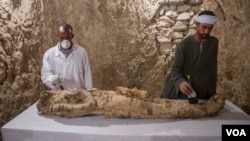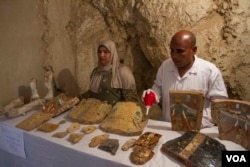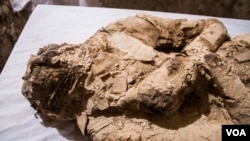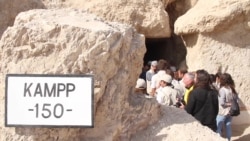Egypt authorities announced Saturday that archaeologists had discovered two small ancient tombs in Luxor, a southern city.
The tombs date back about 3,500 years and are located on the west bank of the river Nile.
"It's truly an exceptional day. … The 18th dynasty private tombs were already known. But it's the first time to enter inside the two tombs," Antiquities Minister Khaled al-Anani said.
Egyptian officials hope the discovery will help the country's efforts to revive tourism.
The minister said one tomb has five entrances that lead to a rectangular hall where two burial shafts are located on the northern and southern sides of the tomb.
The tomb contains a mummy wrapped in linen, clay vessels, a collection of about 450 statues, and painted wooden funerary masks.
Al-Anani said a cartouche carved on the ceiling bears the name of King Thutmose I of the early 18th dynasty.
The other tomb has a 6-meter burial shaft "leading to four side chambers," which contained artifacts including fragments of wooden coffins. The wall inscriptions and paintings are believed to belong to an era between the reigns of King Amenhotep II and King Thutmose IV, both pharaohs of the 18th dynasty.
IN PHOTOS: Discovery of Two Ancient Tombs Announced in Egypt
The tombs are the latest discovery in Luxor, which is known for its temples and tombs from different dynasties of ancient Egyptian history.
Al-Anani also visited a nearby site where the famous Mortuary Temple of Hatshepsut is located. For the first time, the temple's main sanctuary, known as the Holy of Holies, was opened.
The Antiquities Ministry has made a series of discoveries since the beginning of 2017.
In September, Egyptian archaeologists announced they had found the tomb of a royal goldsmith whose work was dedicated to the ancient Egyptian god Amun. The goldsmith lived more than 3,000 years ago. In the tomb, there were mummies, jewelry and statues.
WATCH: Egypt Announces Discovery of Two Ancient Tombs in Luxor









